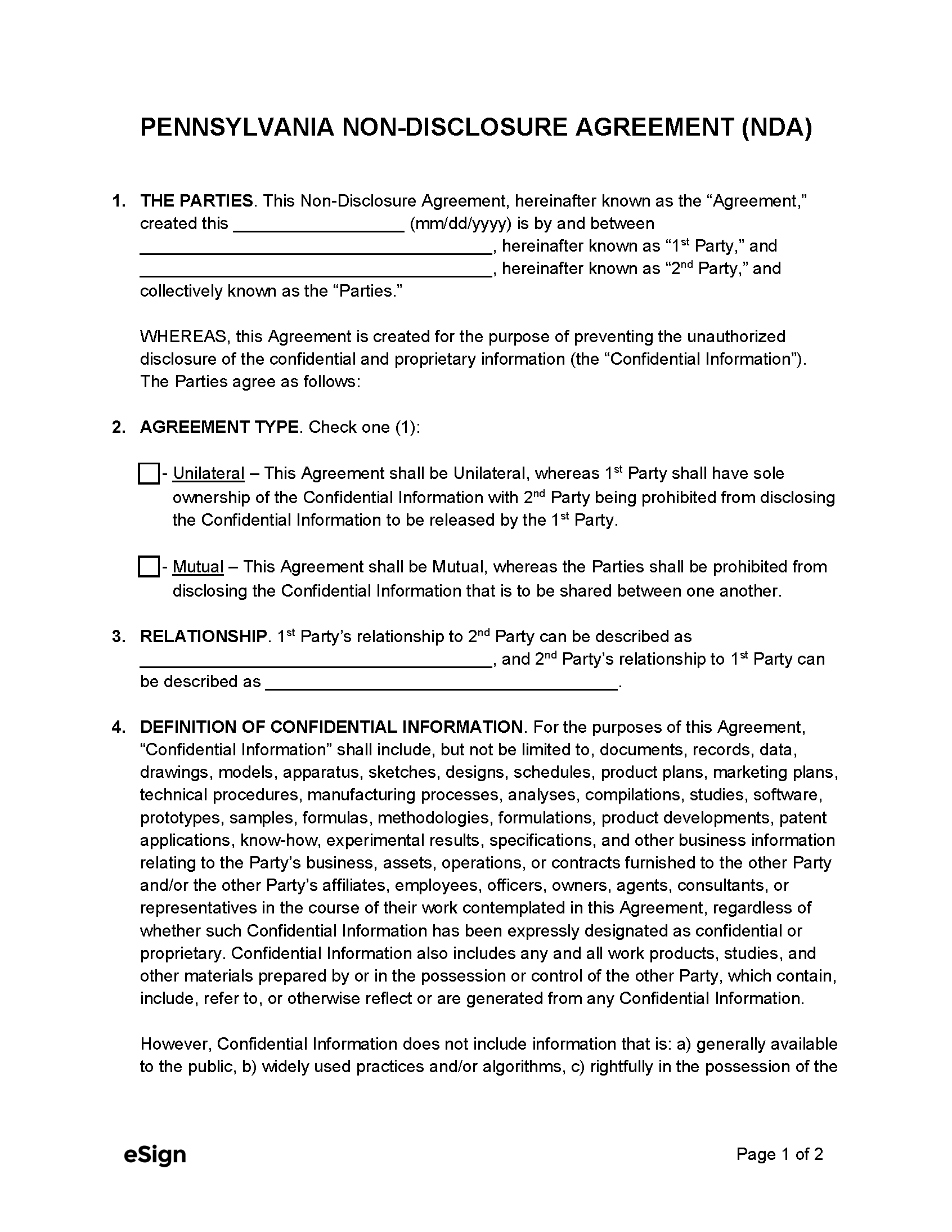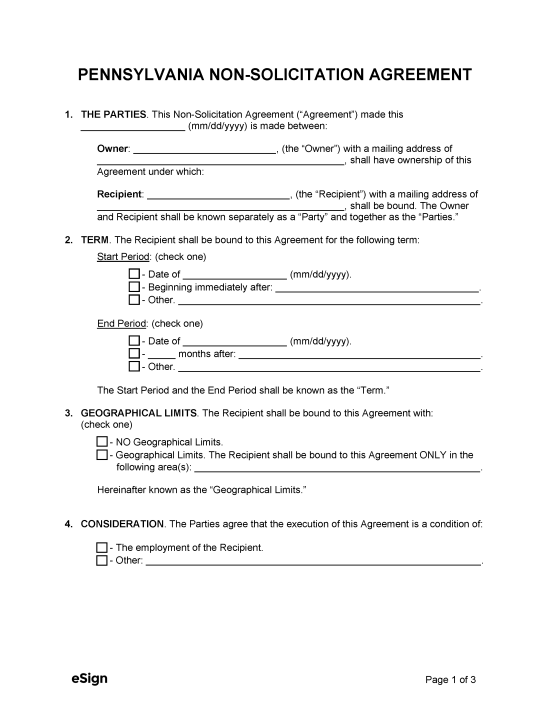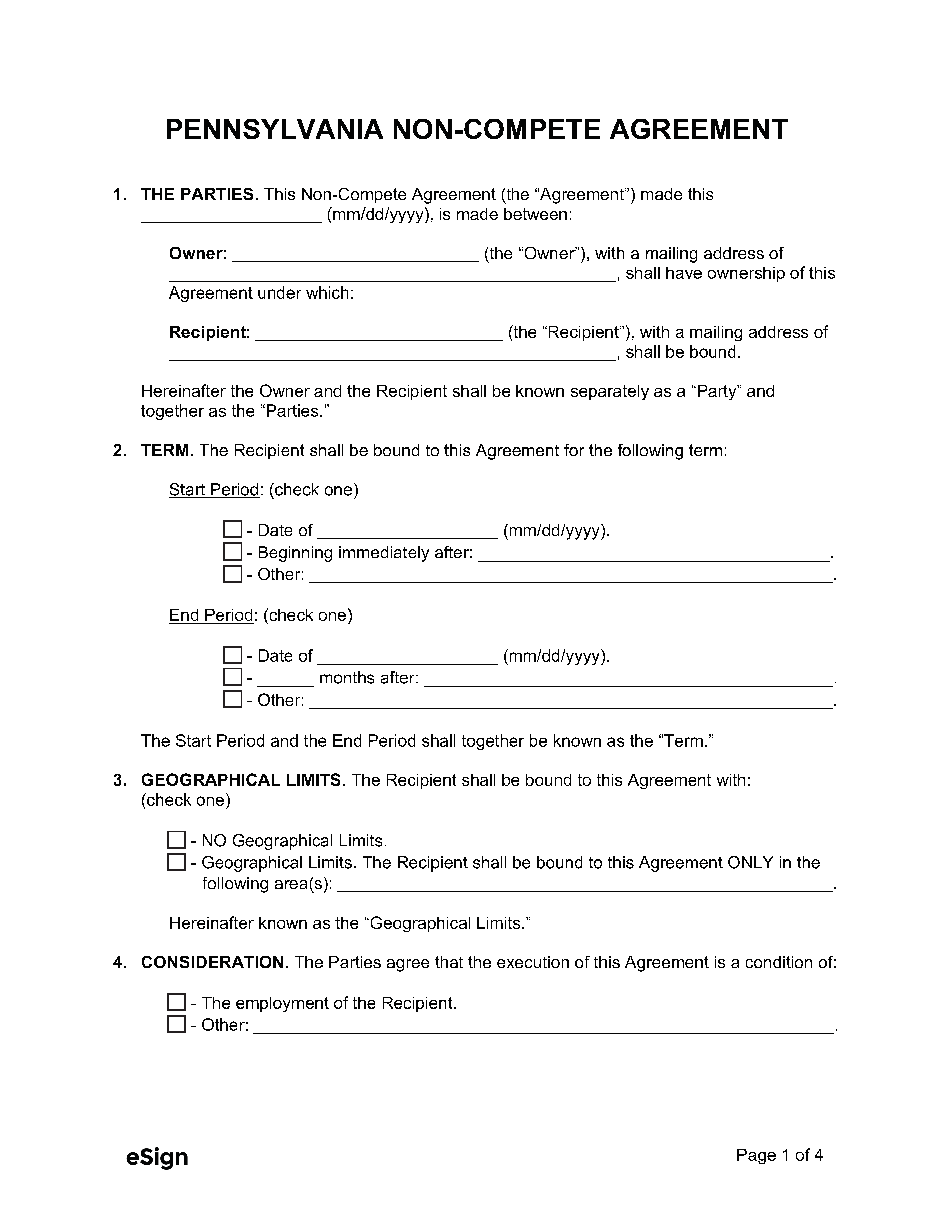While no state laws govern the use of a non-compete agreement (NCA), one can look at prior court rulings to determine what is deemed enforceable.
Contents |
Enforceability in Pennsylvania
Non-compete agreements are enforceable in Pennsylvania. Though no state statutes determine what governs NCAs, Pennsylvania courts will apply what is referred to as a “balancing test” to determine whether the agreement is enforceable. This test weighs the employer’s interests against the employee’s ability to work in their profession and earn a living; the result of that test must then be balanced again against public interest.[1]
When it IS Enforceable
Pennsylvania court generally enforces non-competes if the following requirements set forth by the Supreme Court are met:[2]
- The restrictive provision is “incident to an employment relationship between the parties and supported by consideration.”
- The contract is necessary to protect the employer’s business interests.
- The restrictions are reasonable in duration and geographical radius.
In the case of Missett v. Hub Intern. Pennsylvania, the trial court used the following factors (among others) to determine the reasonableness of the executed non-compete agreement of a terminated employee:[3]
- Whether confidential information was provided from the employer to the former employee, and if that information could be used to adversely affect the employer’s business.
- Whether the employee signed similar restrictive agreements in the past.
- If enforcing the covenant will limit the employee’s ability to earn a living and support their family, and if the amount of potential customers in the area is small enough to restrict the employee from developing their own business.
- Whether non-compete agreements were standard in the industry that the employee works in.
When it’s NOT Enforceable
- Practicing law. A lawyer may not be restricted from practicing law after the termination of a business relationship. Additionally, they cannot be prohibited from practicing through the settlement of a client controversy.[4]
Maximum Time Period
Pennsylvania law does not specify any time restrictions for non-compete agreements. Pennsylvania courts have been shown to uphold one (1)[5] to three (3)[6] year limits.
In some cases, the court has also reduced the time restrictions they deemed too restrictive. For example, in the case of Kramer v. Robec, the covenant was reduced by one (1) year,[7] and in the case of Harry Blackwood, Inc. v. Caputo, a five (5) year covenant was changed to a three (3) year covenant.[8]
Geographical Area
How Pennsylvania courts will determine if a geographical area restriction is enforceable will depend on the industry, and whether it is limited to the area of the employee’s duties.[9] For example, a district court upheld nationwide covenants in a case where the scope of the employee’s work while employed spanned across the entire country.[10]
In the case of Wellspan Health v Bayliss, the non-compete restricted the covenants to only the county where the employee worked when their duties were more localized.[11]
Consideration
In general, if a non-compete agreement is executed at the beginning of employment, then hiring is considered a reasonable consideration.[12] Continued employment is not deemed sufficient consideration to uphold a non-compete,[13] if the employer wishes to employ the use of an NCA after employment commences, it will not be enforceable unless the employee receives a “corresponding benefit or change in status.[14]
Sources
- Hess v. Gebhard Co. Inc., 570 Pa. 148, 163, 808 A.2d 912, 917 (Pa. 2002)
- Rullex Co. v. Tel-Stream, Inc., 232 A.3d 620, 624 (Pa. 2020)
- Missett v. Hub Intern. Pennsylvania, 6 A.3d 530, 2010 Pa. Super. 178 (Pa. Super. Ct. 2010)
- PA ST RPC Rule 5.6
- National Business Services, Inc. v. Wright, 2 F. Supp. 2d 701, 709 (E.D. Pa. 1998)
- Bryant Co. v. Sling Test. Repair, 471 Pa. 1, 13, 369 A.2d 1170 (Pa. 1977)
- Kramer v. Robec, Inc., 824 F. Supp. 508, 513 (E.D. Pa. 1993)
- Harry Blackwood, Inc. v. Caputo, 290 Pa. Super. 140, 143, 434 A.2d 169, 170-171 (Pa. Super. Ct. 1981)
- Victaulic v. Tieman, 499 F.3d 227, 237 (3d Cir. 2007)
- Quaker Chemical Corporation v. Varga, 509 F. Supp. 2d 469, 476 (E.D. Pa. 2007)
- Wellspan Health v. Bayliss, 869 A.2d 990, 994, 2005 Pa. Super. 76, 2005 Pa. Super. LEXIS 171 (Pa. Super. Ct. 2005)
- Rullex Co. v. Tel-Stream, Inc., 232 A.3d 620, 626 (Pa. 2020)
- George W. Kistler, Inc. v. O’Brien, 464 Pa. 475, 485, 347 A.2d 311, 316 (Pa. 1975)
- Maintenance Specialties v. Gottus, 455 Pa. 327, 333, 314 A.2d 279, 281 (Pa. 1974)
Related Forms (2)

Download: PDF, Word (.docx), OpenDocument

Download: PDF, Word (.docx), OpenDocument
